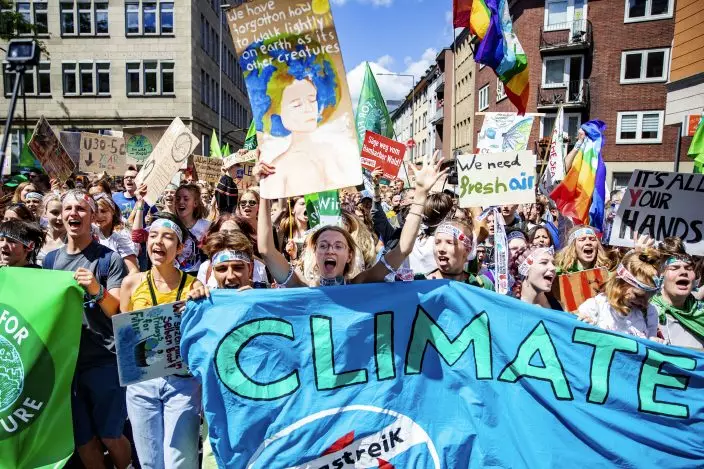Thousands of students from across Europe protested Friday near a coal mine in western Germany, calling on governments to take bolder action against climate change.
Organizers said up to 20,000 protesters from 16 countries took part in the rally in Aachen, near Germany's border with Belgium and the Netherlands.
Demonstrators carried colorful signs and banners with slogans like "your greed costs us our future," ''climate justice: that's what we want," and "stop coal."

People take part in a 'Fridays for Future' protest rally in Aachen, Germany, Friday, June 21, 2019. (Marcel Kuschdpa via AP)
It comes a day after European Union leaders failed to agree a plan to make the bloc's economy carbon neutral by 2050. Several large European countries — including Britain, France and Germany — have backed the target, but coal-reliant countries in the east, such as Poland, blocked consensus on the proposal, which entails an almost complete phase-out of fossil fuel use.
Friday's protest took place near the site of one of Germany's biggest lignite coal mines. The mine has become a focus of environmental protests in recent years because its operator, utility company RWE, threatened to chop down a nearby forest.
Further protests are expected at the site over the weekend. Police have mobilized hundreds of officers and a water cannon to prevent the vast, open-cast mine and adjacent power plants from being blocked by protesters.

People take part in a 'Fridays for Future' protest rally in Aachen, Germany, Friday, June 21, 2019. (Marcel Kuschdpa via AP)
The German government has approved an expert proposal to end the use of coal for electricity by 2038. Activists say that's not soon enough if Germany wants to help achieve the 2015 Paris climate accord's most ambitious goal of keeping global temperatures from rising more than 1.5 degrees (2.7 Fahrenheit) by mid-century, compared to pre-industrial times.
Following months of protests by students and a sharp rise in the polls for Germany's Green party, Chancellor Angela Merkel recently threw her weight behind the idea of making the entire economy climate neutral by 2050 — meaning no more man-made greenhouse gases would be added to the atmosphere.
Speaking after the end of the EU leaders' meeting in Brussels, Merkel noted that a "big majority" of the bloc's 28 member states now backs that goal.
"A few others need to spend a bit more time working out what this means for their internal measures," she said, without calling out the countries by name.
But campaigners called the EU's failure to agree a unified position ahead of a U.N. climate summit in September "shameful."
"The EU is in danger of being associated with climate pariah states like the U.S. and Brazil," said Mohamed Adow, a climate policy expert at Christian Aid. "They must stop hiding behind a handful of blockers if they want to claim any leadership on the global stage."
Kirsten Grieshaber contributed to this report.


